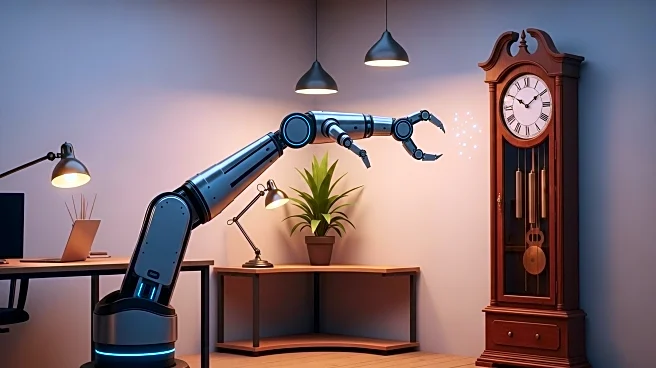What is the story about?
What's Happening?
Walmart's CEO, Doug McMillon, has announced that artificial intelligence (AI) will significantly impact every job within the company and beyond. Despite the potential for AI to replace certain roles, McMillon emphasized that Walmart's global workforce of approximately 2.1 million employees will remain stable over the next three years. The company is actively tracking job trends to identify which roles may decrease, increase, or remain unchanged, aiming to prepare its workforce for the evolving job landscape. Walmart plans to introduce 'cutting-edge AI training' for its U.S. store and office staff in collaboration with OpenAI, starting next year. This initiative is part of Walmart's broader strategy to integrate AI tools, such as the GenAI-powered shopping assistant Sparky and internal tool Wally, to enhance customer service and operational efficiency. However, McMillon expressed skepticism about adopting humanoid robots, preferring to maintain a human touch in customer interactions.
Why It's Important?
The integration of AI into Walmart's operations highlights a significant shift in the retail industry, where technology is increasingly used to enhance efficiency and customer experience. This move could set a precedent for other retailers, potentially leading to widespread changes in employment structures and job roles. While AI offers opportunities for innovation and growth, it also poses challenges, such as the need for workforce retraining and potential job displacement. Walmart's approach to maintaining its workforce size while embracing AI reflects a balanced strategy that could influence industry standards. The company's focus on human-centric service, despite technological advancements, underscores the ongoing value of human interaction in retail.
What's Next?
Walmart's next steps involve implementing AI training programs for its employees and continuing to evaluate the impact of AI on various job roles. The company's collaboration with OpenAI suggests a commitment to equipping its workforce with the necessary skills to adapt to technological changes. As Walmart navigates this transition, other retailers may observe and potentially adopt similar strategies. The broader retail industry will likely monitor Walmart's progress to assess the effectiveness of AI integration and its impact on workforce dynamics.
Beyond the Headlines
Walmart's decision to prioritize human interaction over humanoid robots raises ethical and cultural considerations about the role of technology in society. The company's stance suggests a recognition of the importance of preserving human elements in customer service, which could influence public perception and consumer trust. Additionally, Walmart's approach may prompt discussions about the ethical implications of AI in the workplace, including issues of privacy, job security, and the digital divide.
















